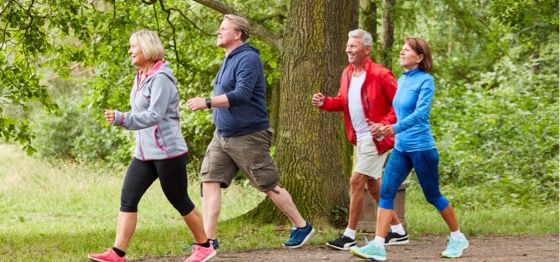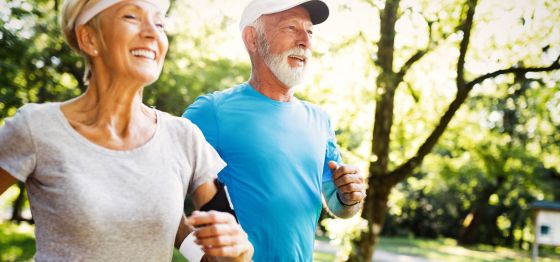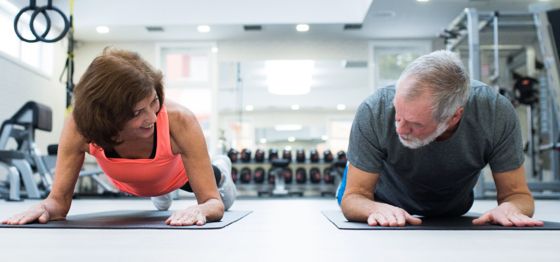While older adults may not interact with nature in the same ways they did earlier in life, connecting regularly with “green” and “blue” spaces (environments with running or still water) brings many benefits.1
Benefits of senior outdoor activities
Seniors who walk about 2 hours per week had a lower risk of death than those who did not, according to a study by the American Cancer Society.2
Physical activity, in general, has been shown to improve obesity, type 2 diabetes, cardiovascular and mental illness and sleep quality as well as life expectancy.3 Being outdoors may boost these benefits. International epidemiological studies found that merely having access to nature lowers rates of cardiovascular disease, stroke, obesity and depression, and is associated with better immune function. 4
Outdoor activity may benefit the brain as well. Hiking has been shown to directly benefit brain function, even in adults already experiencing mild cognitive impairment.5 Research indicates staying active lessens the effects of “brain fog” for those undergoing chemotherapy or with Long COVID symptoms, while promoting gray matter retention.6
Hiking provides the stress-reducing benefits of spending time in nature along with challenges to the hippocampus as well as spatial navigation and memory, all of which support neuroplasticity.7
Outdoor exercise also helps seniors get Vitamin D, which is important for bones, blood cells and the immune system.8 Sunlight supports serotonin levels, which may help to boost energy and maintain a calm, positive and focused mood. Exercising outdoors with a friend provides important socialization as well. Relaxed outdoor activity may boost self-esteem, focus and creativity, too.9
Ideas for outdoor exercises for seniors
Simply walking outside provides many benefits. The push of the wind and the uneven ground causes the body to use a variety of muscles and ask the brain to adapt to a subtly changing environment.10 A brisk 30-minute walk boosts blood flow, strengthens heart and bones, improves sleep quality and mental health and lowers the risk of dementia.11 Walking is 1 of the best forms of cardio exercise for seniors as it can be modified to match each individual’s abilities. While walking does require good balance, it can still be effective for those who use a cane or walker.12
Tai chi is a series of slow, gentle, meditative movements that improve upper- and lower-body strength, flexibility and balance.13 It is particularly useful for helping improve the body’s awareness of itself in space, leading to a reduced risk of falls.14
Yoga classes are often offered outdoors and boost blood flow, ease arthritis symptoms, support the heart, improve sleep and lower stress.15
Biking is a non-impact activity that builds strength and cardiovascular health while working the muscles that maintain balance. Recumbent bikes may be best for seniors with back pain or increased risk of falls.16
Gardening is exercise! A regular gardening practice delivers the benefits of interacting with nature while moving the body enough to help prevent osteoporosis and lower the risk of diseases like cancer, type 2 diabetes, depression and heart disease.17
An 18-hole game of golf provides the opportunity to walk up to 4 miles.
Tennis with a well-matched partner builds cardio endurance and improves heart and lung health as well as blood flow.18
Swimming is a good, low-impact exercise that allows seniors to build cardio endurance while keeping stress on the body low. Water aerobics classes or even walking across a shallow pool provides benefits as well.19
Forest Bathing offers therapeutic effects for older adults, reducing blood pressure and inflammation.20 Called Shinrin Yoku in Japan, forest bathing simply means spending time in a forest environment. Studies show forest bathing can help boost energy, immune function, sleep quality and recovery time.21
Safety tips for senior outdoor activities
Along with consulting a doctor before beginning any new activity, important tips for outdoor exercisers include: 22
- Carry ID and emergency contact information, a small amount of cash and a cell phone.
- Remain alert. Don’t talk on the phone and keep headphone/earbud volume low.
- Be visible. Wear light or brightly colored clothing during the day and reflective material at night.
- Wear sturdy shoes that provide appropriate footing for the location and activity, to reduce the risk of falls.
- Choose routes that are populated and well-lit, with places to stop and sit when necessary.
Be aware of traffic:
- Walk during daylight hours.
- Face oncoming traffic.
- Walk on a sidewalk or path whenever possible, and look for a smooth, stable surface to reduce exposure to tripping hazards.
- Cross streets at crosswalks or intersections and pay attention to traffic signals.
- Never assume oncoming drivers will stop.
- Consider city parks that offer trails protected from vehicle traffic.
In hot weather:
- Drink plenty of liquids, like water and fruit juice. Avoid caffeine and alcohol.
- Wear light-colored, loose-fitting clothes made of natural, breathable fabrics.
- Wear layers so clothing can be removed as body temperature increases.
- Know the signs of heat stroke and get medical help if necessary.
In cold weather:
- Watch out for snow and ice that my make terrain treacherous.
- Warm up the muscles first.
- Wear several layers of loose clothing to trap heat.
- Wear a waterproof coat, as well as a hat, scarf and gloves.
- Know the signs of hypothermia and get medical help if necessary.
Whether exercising or not, prioritize everyday contact with nature. Simply sitting in a park or even tending to a windowsill garden may improve mental well-being. While exercise is important, and exercising outdoors is ideal, simply being outdoors at some point most days may increase quality of life for seniors.23
Go365 by Humana® makes wellness fun and easy. We help Humana Medicare members with Go365® on their plan reach health goals as well as take care of their physical and emotional health—allowing members to thrive at any age.
Humana Medicare members with Go365 on their plan can enroll in Go365 at
Go365 is a well-being and rewards program for many Humana Medicare Advantage members. Rewards have no cash value and can only be redeemed in the Go365 Mall. Rewards must be earned and redeemed within the same plan year. Any rewards not redeemed by December 31st will be forfeited.
To learn more about Humana Medicare Advantage, call to speak with a licensed Humana sales agent at 1-844-321-5843 (TTY:711), Monday – Friday, 8 a.m. – 8 p.m. local time or visit
If you need to enroll in Medicare Advantage or change your plan outside of the usual Medicare enrollment periods, a Special Election Period (SEP) could be the answer. For information on eligibility, visit Humana’s
Sources:
1Sarah Hubbart, “Enjoy the Health Benefits of Outdoors at Any Age,” NEEF, last accessed October 19, 2022.
2Hubbart, “Enjoy the Health Benefits of Outdoors at Any Age.”
3Hubbart, “Enjoy the Health Benefits of Outdoors at Any Age.”
4Hubbart, “Enjoy the Health Benefits of Outdoors at Any Age.”
5Hubbart, “Enjoy the Health Benefits of Outdoors at Any Age.”
6Hubbart, “Enjoy the Health Benefits of Outdoors at Any Age.”
7Hubbart, “Enjoy the Health Benefits of Outdoors at Any Age.”
8Carmelita Swiner, “Health Benefits of Getting Outside,” WebMD, last accessed October 19, 2022.
9Swiner, “Health Benefits of Getting Outside.”
10Swiner, “Health Benefits of Getting Outside.”
11Michael W. Smith, “Safe Outdoor Exercises for Older Adults,” WebMD, last accessed October 19, 2022.
12Rachel Tavel, “A Guide To The Best Exercises For Seniors,” Forbes Health, last accessed October 19, 2022.
13Smith, “Safe Outdoor Exercises for Older Adults.”
14Tavel, “A Guide To The Best Exercises For Seniors.”
15Smith, “Safe Outdoor Exercises for Older Adults.”
16Smith, “Safe Outdoor Exercises for Older Adults.”
17Smith, “Safe Outdoor Exercises for Older Adults.”
18Smith, “Safe Outdoor Exercises for Older Adults.”
19Smith, “Safe Outdoor Exercises for Older Adults.”
20Hubbart, “Enjoy the Benefits of Outdoors at Any Age.”
21Swiner, “Health Benefits of Getting Outside.”
22“Safety Tips for Exercising Outdoors for Older Adults, “National Institute on Aging, last accessed October 2022.
23Hubbart, “Enjoy the Health Benefits of Outdoors at Any Age.”
This information is provided for educational purposes only. It is not to be used for medical advice, diagnosis or treatment. Consult your healthcare provider if you have questions or concerns.
Go365 is not an insurance product and is not available with all Humana health plans. This is a general description of services which are subject to change. Product features may vary by client. Please refer to Customer Support for more information.
Humana is a Medicare Advantage HMO, PPO and PFFS organization and a stand-alone prescription drug plan with a Medicare contract. Humana is also a Coordinated Care plan with a Medicare contract and a contract with the state Medicaid program. Enrollment in any Humana plan depends on contract renewal.
Consult your doctor before beginning any new diet or exercise regimen.




